On the afternoon of September 29, 2017, the Jinyun Forum on Life Health and Nutrition Engineering is co-held by Chongqing University Association for Science and Technology, School of Life Science and Chongqing Nutrition Society at Lecture Hall LA101, Science Building, Huxi Campus of Chongqing University. Six scholars and experts are invited to the Forum and deliver 6 academic reports on the themes, namely “nutrition, health and innovation”. More than 200 students and teachers from the School of Life Science, the School of Bioengineering and other related schools have attended the Forum. Professor Li Zhengguo, the vice dean of the School of Life Science, and Professor Ren Maozhi, the assistant to the dean, have chaired the Forum.

Professor Lei Xingen, a scholar of the “Recruitment Program of Global Experts” of Organization Department of the Central Committee of the CPC from Cornell University, gives a brief introduction to the knowledge of selenium, a microelement. After that, he delivers a speech titled “Selenium supplementation and biofortification in China: Benefit or risk?” In the early stage of selenium research, the researchers once deemed it as toxic. Later, experiments have proved that the selenium enrichment helped with cancer treatment, and high selenium content could induce insulin resistance. Professor Lei and his experiment team have been dedicated to exploring the effecting mechanism of high selenium content on increase of blood glucose and blood fat. Furthermore, Professor Lei tells the audience that a science-based understanding of selenium is very important. Uptake of the selenium should be based on the specific physical condition and excessive selenium may do harm to our body.
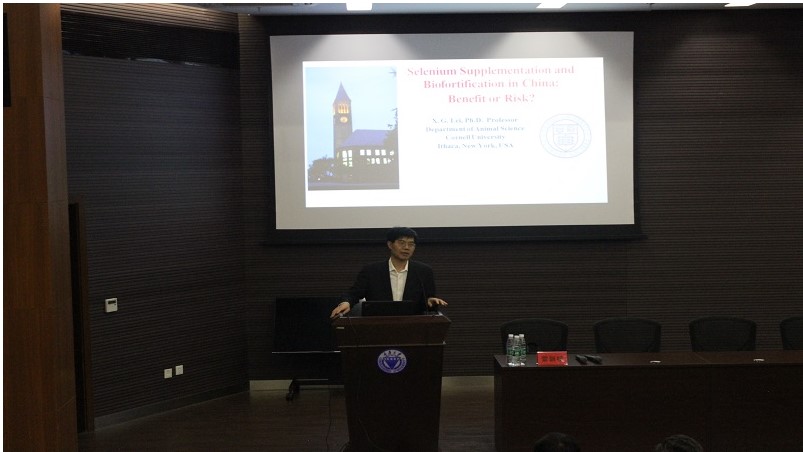
Professor Zhang Huidong, one of the ten batches of experts of “Recruitment Program of Global Experts” of Organization Department of the Central Committee of the CPC from the Third Military Medical University, discusses with the attendants about the “Molecular Mechanism of DNA Damage Resulting in DNA Replication Mutation and Disorder”. DNA damage as a result of environmental pollution will lead to mutation and disorder of DNA replication and RNA transcription, which will further result in change of the protooncogene and cancer suppressor gene, and ultimately cause cancer. Researcher Li Xianliang, deputy director of the Technical Center of Chongqing Entry Exit Inspection and Quarantine Bureau, has a profound analysis of food safety concerns, including the “European” toxic eggs” event and the lessens learned from the event. Professor Li also explains the response to the event from the perspective of professional science, which has raised concern of the audience.
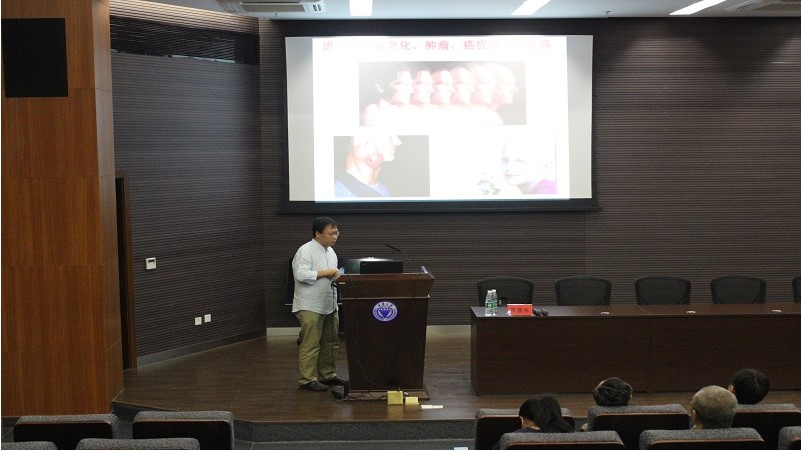
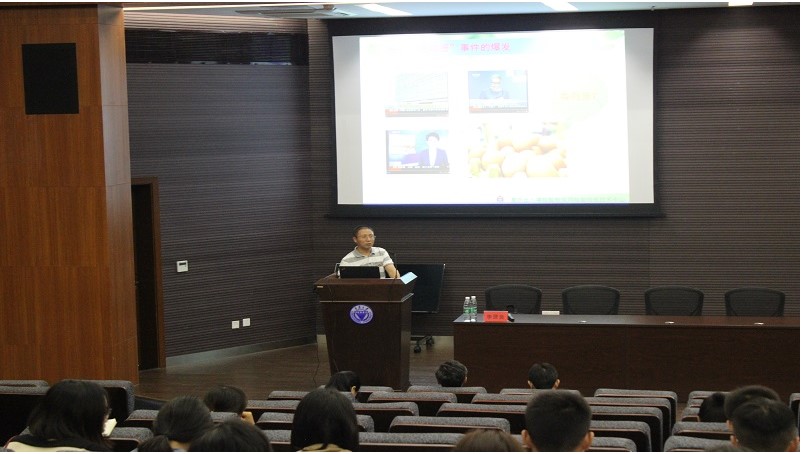
Director Wang Jian from the Nutrition Department of Xinqiao Hospital of the Third Military Medical University delivers a speech titled “How Far is Diabetes away from You?” The prevalence rate of diabetes in China has reached 11.6% and it ranks the 4th to the 5th place in terms of cause of death. Obesity is an independent risk factor for onset of diabetes. Therefore, the most effective way to treat and prevent diabetes is to change the diet and mode of life. The five principles and eight measures to prevent and fight against diabetes have raised interests among the teachers and students present. Doctor Wang Yi from the Technical Center of Chongqing Entry Exit Inspection and Quarantine Bureau explains the “basic information on meat import and export of Chongqing and requirements for inspection and quarantine”, and introduces the audience to the three steps taken in China to control the safety of imported and exported food. Given the “One Belt and One Road” strategy and the major deployment of the Yangtze River Economic Zone, Chongqing will combine “Cuntan Port, Airport Import and Railway Import”, so as to provide one-stop port service for import and export of meat. Associate Researcher Qiu Dan from the School of Life Science of Chongqing University delivers a speech titled “Translating Soybean functional genomics into improving human health” and explains to the audience how the soybeans would gradually become one of the main food sources to fight against hunger and how it is effected by drought and flood and plant diseases and insect pests and how scientists are eager to find a soybean type with high yield, high protein content, nematode resistance and draught and flood resistance. Doctor Qiu has selected nearly 1,000 core varieties from the 15,000 samples at the Soybean Germplasm Resource Center of the United States Department of Agriculture, and successfully found 11 key genes. This has laid a solid foundation for cultivation of soybeans resistant to nematode, draught and flood.
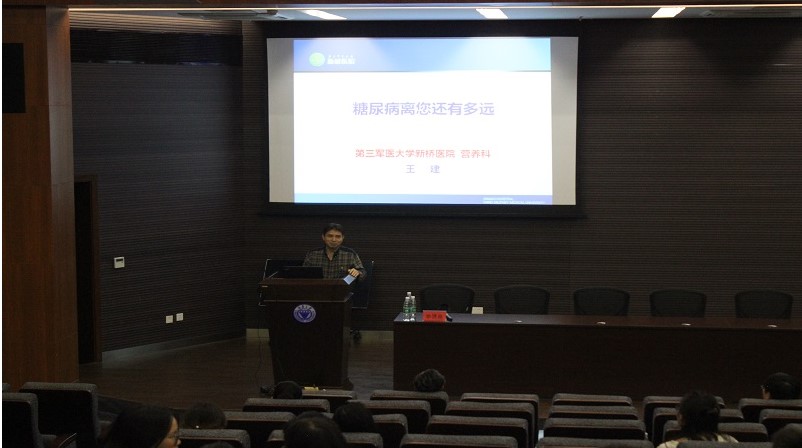
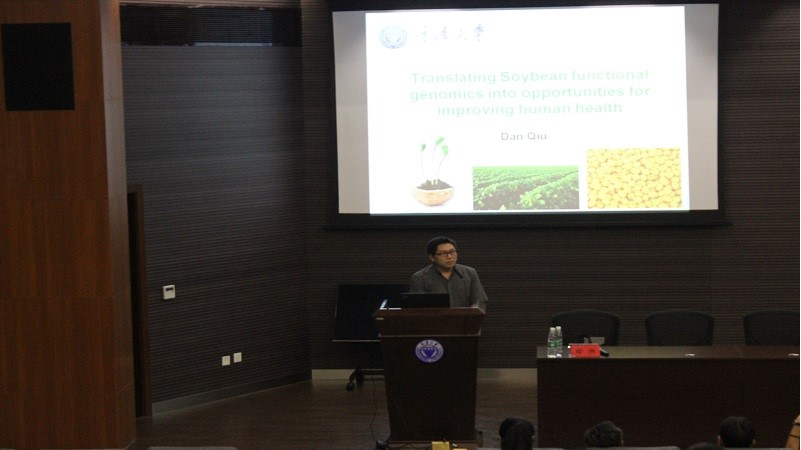
Vice Dean Li Zhengguo delivers a summary report on the Forum, and encourages the audience to take care of their own health, provide more scientific and technological products, and better nutrition and health services for their families, friends and the society while carrying out research and learning professional knowledge.
In addition, on the morning of September 29, Professor Lei pays a visit to the lab of the School of Life Science accompanied by related teachers of the School, and discusses with the teachers with respect to related research work.
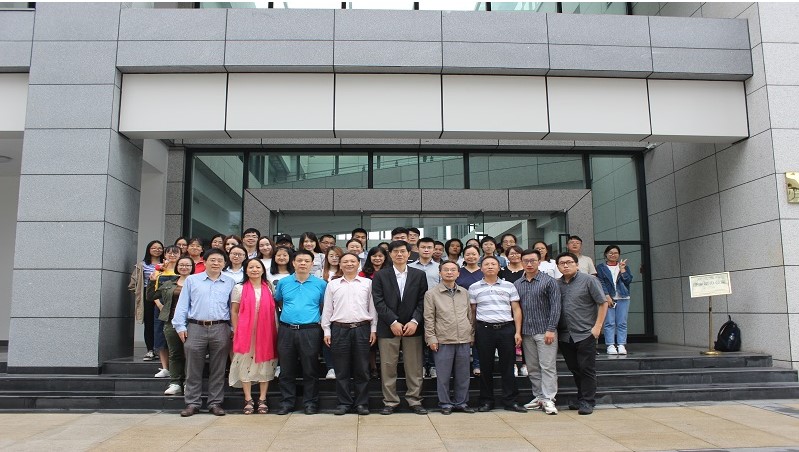
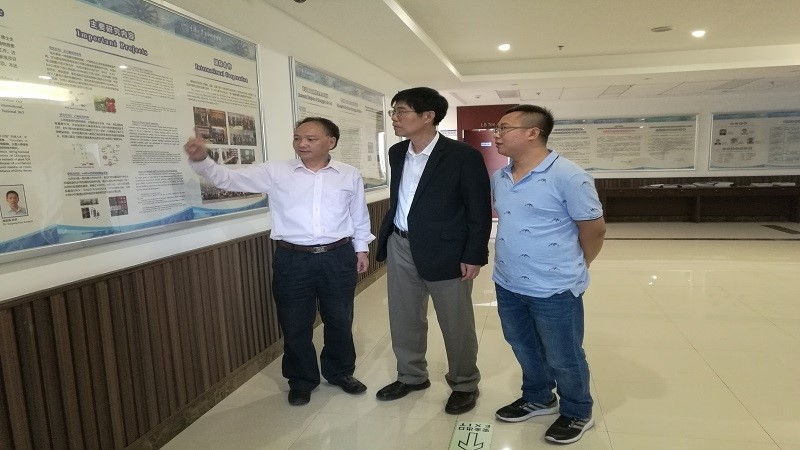
Profile of the experts
Lei Xingen, doctor, lifetime professor of Cornell University, a scholar of the “Recruitment Program of Global Experts”, a chair professor of the “Yangtze River Scholar Program” of the Ministry of Education, a member of the Assessment Panel of Human Nutrition and Food Scientific Research Project of NRI of the United States Department of Agriculture, an editorial board member of the Journal of Animal Science, and the chairman of Academic Committee, Nutrition Group, American Society of Animal Science, mainly engaged in research of animal science and nutriology; his main research areas include: molecule and environment nutrition, and analysis of oxidation resistance and cancer resistance effect of microelements on the organisms. Professor Lei has published more than 100 SCI indexed papers.
Zhang Huidong, doctor, professor, one of the ten batches of experts of “Recruitment Program of Global Experts” of Organization Department of the Central Committee of the CPC, winner of the National Outstanding Youth Fund, a professor of the Toxicology Research Institute and the Teaching and Research Office of Biochemistry and Molecular Biology of the Third Military Medical University, doctoral supervisor, and assistant to the director of the Toxicology Research Institute; Professor Zhang has published 26 SCI indexed papers on PNAS, JBC and other journals.
Li Xianliang, doctor, researcher, deputy director of the Technical Center of Chongqing Entry Exit Inspection and Quarantine Bureau, appraising expert of SPS/TBT Notification of Standard and Law Center of General Administration of Quality Supervision, an appraisal board member of Chongqing local standard for food safety, a member of Chongqing Food Safety Expert Committee, an “academic leader of food inspection” of Chongqing Entry Exit Inspection and Quarantine Bureau, and the vice chairman of Expert Committee on Environment and Product Quality Inspection of Chongqing Analysis and Test Society, mainly engaged in testing, scientific research and management of food and cosmetics; Li has chaired 5 scientific research projects and preparation of 4 standards, and filed application for 9 patents; he has published 46 papers and won 11 ministerial-level and provincial awards for science and technology achievements.
Wang Jian, doctor, an associate chief physician, director of the Nutrition Department of Xinqiao Hospital, Third Military Medical University, vice chairman of the Specialized Committee on Clinical Nutrition of Chinese Medical Doctor Association and the head of the Parenteral Nutrition Group, a standing member and general secretary of Medical Nutrition Branch of Chinese Research Hospital Association, and vice chairman of Chongqing Nutrition Society and chairman of the Specialized Committee on Clinical Nutrition; Wang has successively won the “first prize for progress in science and technology of Chongqing, “the third prize for scientific and technological progress of the entire army”, and the “second prize for outstanding young talent of Chongqing in nutritional science”.
Qiu Dan, doctor, an associate professor of the School of Life Science, Chongqing University; Qiu has been engaged in scientific research and teaching of plant molecular biology and phytopathology at University of California, Davis, Washington State University and University of Missouri for more than 10 years, and has published 13 SCI indexed papers, which have been cited for more than 700 times.
